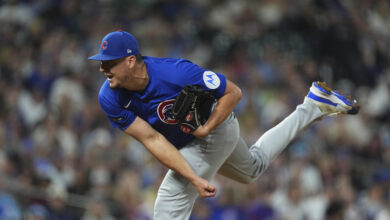
Could Umpires’ Reported Distaste for Joe Maddon Impact Calls Cubs Get?
Joe Maddon is quick to defend his players when calls aren’t going their way, and his loyalty to them has gotten him kicked out of a few ballgames here and there. And though the player he’s defending will sometimes be tossed as well — see Carl Edwards Jr. in Monday’s debacle — the manager is generally getting in the ump’s face in order to keep said player in the game.
But there can be a cost to those methods, particularly when you’re dealing with a group as maligned as MLB umpires. As much as they’re supposed to be impartial arbiters of the game, they’re still human beings and are subject to the same emotions and instincts as the rest of us. They’re also a pretty small group that is often on the defensive in this age of high-def replays and visible strike-zone graphics.
So you can understand how they might not take too kindly to what they perceive as poor treatment from one of the game’s most (in)famous managers. In his weekly appearance on the Mully & Haugh Show on 670 The Score Tuesday morning, Jon Heyman said flat-out that the umps don’t like Maddon.
“The umpires are not big fans of Joe Maddon,” Heyman said. “I don’t know if that’s out there or not, but that is the truth. He’s a very charming guy, we all love him, but he is very, very enthusiastic about defending his players and getting on the umpires and they’re not too thrilled with him, generally speaking.”
Well, Jon, it’s certainly out there now. Not that it should come as any surprise given what was discussed above. I’m sure Maddon will tell you he couldn’t care less whether the game’s officials like him or not, so long as they call everything fairly.
Which is where we get to the crux of the matter and the idea that the umpires’ collective distaste for Maddon might influence their calls during Cubs games. And I’m not getting conspiratorial on you here, just putting it out there as scientific fact: Officials are biased.
A 2002 study by the University of Wolverhampton’s Alan Nevill concluded that crowd noise “influenced referees’ decisions to favor the home team.” University of Bath researcher Dr. Peter Dawson also found that officials generally “favor home teams.” Then there’s a 2007 study by Ryan Boyko, then a research assistant in the Department of Psychology at Harvard University, which found that crowd noise indeed contributes to home-field advantage by influencing officials’ calls.
Even if you’re unwilling or unable to plow through all the deep psychological stuff, there’s some basic common sense at it’s core. By and large, humans have an innate desire to want to please others and to be praised for their work. So even though they might not consciously be doing it, they’re generally going to make calls that favor the home crowd, which, with the notable exception of the Cubs playing in Milwaukee, is larger and louder.
But that all presupposes a lack of inherent bias, which Heyman’s assertion sort of throws out the window in the case of umpires calling Cubs games. Or does it? While it’s entirely reasonable to think they might be more willing to give Maddon the old heave-ho, there’s a possibility that being called to the table as they just were might actually make them more impartial when it comes to the calls on the field.
Think about it like seeing a police car up ahead in the median. Knowing that the cop is sitting there, you’re going to be extra vigilant of your speed in order to avoid a warning or a ticket. In the same way, umpires may want to be more careful about the calls they’re making when Maddon and the Cubs are involved simply to keep from being looking biased.
Phil Jackson was a master of this in his days with the Bulls and Lakers, just like Mike Krzyzewski is now with Duke. Even though their teams got/get plenty of calls, they were constantly going on about getting the short end of the stick. Sure enough, things seemed to trend more in their favor in the second half or in the next game.
Of course, this is all total conjecture based on my rudimentary grasp of psychology and basic human behavior. I do find this specific topic worthy of discussion, though, even if it’s just a short aside in the ongoing battle between players and umpires. Already this season we’ve gotten chapters from Ben Zobrist, who wants an electronic strike zone, and Javy Baez, who just wants umps to talk to players like humans.
Now, it’s entirely possible that we never hear another word about this, that it vanishes like the vestigial humidity fog on my windshield as I listened to Heyman talking this morning. But I made a mental note to write about it because something told me it could factor at some point later this season or next. Maybe beyond, particularly if Maddon gets an extension and grows more cantankerous in his old(er) age.
If nothing else, it got me to go back and check out some of those studies, the concept behind which I’d initially been made aware of by an article in Sports Illustrated back when I used to look forward to getting the mail on Thursdays. So what say you, Dear Reader: Is this just a disposable comment by Heyman or something with greater significance?
If you’d like to hear the interview for yourself, along with talk of Kahlil Mack’s impact on the Bears, you can do so below…

